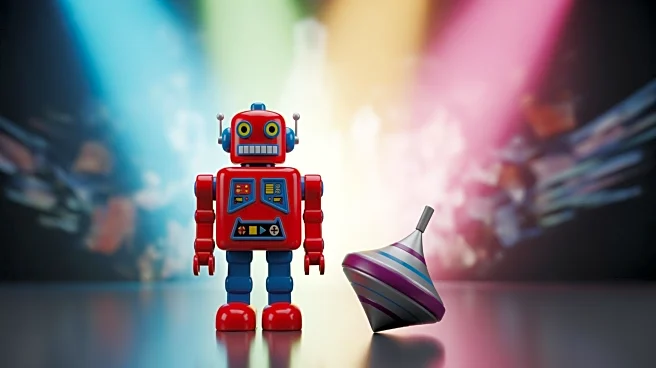What's Happening?
Andrew Robertson, chairman of BBDO Worldwide, discusses the transformative potential of artificial intelligence (AI) in the creative industry. In a recent episode of The Speed of Culture, Robertson emphasized that AI should be viewed not as a threat but as a tool that can eliminate barriers such as time, cost, and technical challenges in the creative process. He argues that AI can serve as an enabler for imaginative thinkers, allowing brands to scale their impact without losing their essence. Robertson, who has been a pivotal figure in advertising for over two decades, highlights the importance of emotional intelligence and risk-savvy thinking in driving breakthrough marketing. He also stresses the need for brands to prioritize talent ecosystems over mere tactical execution, suggesting that securing exceptional talent is crucial for success.
Why It's Important?
The integration of AI into the creative process could significantly impact the advertising industry by streamlining operations and enhancing creative output. This shift could lead to more efficient production processes, allowing creative teams to focus on ideation rather than execution. For brands, embracing AI could mean achieving greater reach and resonance with audiences while maintaining their core values. The emphasis on talent ecosystems suggests a potential shift in hiring practices, with a focus on attracting and nurturing creative minds. This approach could lead to more innovative campaigns and a competitive edge in the market. Additionally, Robertson's insights on risk management could encourage brands to adopt bolder strategies, potentially leading to more impactful and memorable advertising.
What's Next?
As AI continues to evolve, its role in the creative industry is likely to expand, prompting agencies and brands to adapt their strategies. Companies may invest more in AI technologies to enhance their creative capabilities and streamline workflows. This could also lead to a reevaluation of talent acquisition and development strategies, with a focus on fostering creativity and innovation. Brands that successfully integrate AI into their processes may gain a competitive advantage, potentially reshaping the landscape of the advertising industry. Stakeholders, including creative professionals and brand leaders, will need to navigate these changes thoughtfully to maximize the benefits of AI while preserving the human touch in their work.
Beyond the Headlines
The adoption of AI in the creative industry raises ethical considerations, such as the potential for job displacement and the need for responsible AI use. As AI takes on more creative tasks, there may be concerns about the loss of human creativity and the homogenization of content. Agencies and brands will need to address these issues by ensuring that AI is used to complement, rather than replace, human creativity. Additionally, the focus on emotional intelligence and empathy in advertising highlights the importance of maintaining a human connection in an increasingly automated world. This balance will be crucial in ensuring that AI enhances rather than diminishes the creative process.










